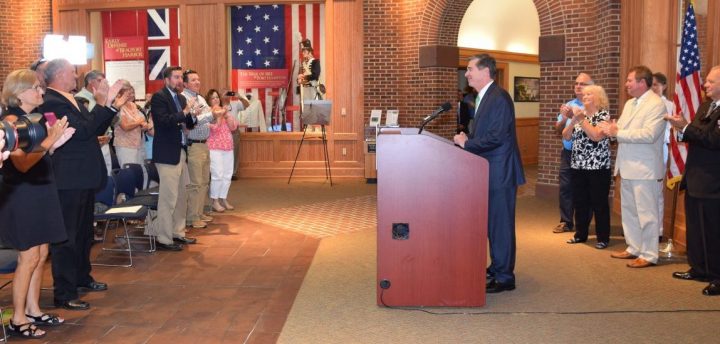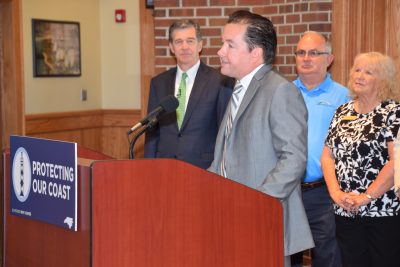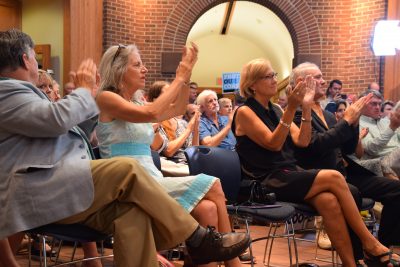
ATLANTIC BEACH – Flanked Thursday by mayors of a half-dozen eastern North Carolina communities, Gov. Roy Cooper cited the threat to the “robust coastal economy” from proposed offshore drilling and seismic exploration for oil and natural gas off the state’s coast and pledged to lead the renewed fight against it.
During an appearance at Fort Macon State Park, Cooper framed his opposition in terms of protecting the state’s coastal environment and economy that it supports from the “unacceptable risks” offshore drilling and exploration could bring, risks that the governor said would outweigh any benefits to the state.
Supporter Spotlight
“I can sum it up in four words: not off our coast,” Cooper said to enthusiastic applause from those gathered in the education and visitor center, including representatives of various environmental groups, local officials and others opposed to offshore drilling and seismic exploration.
“We have consulted with experts and we’ve examined carefully what we know about this,” Cooper said. “It’s clear that opening North Carolina’s coast to oil and gas exploration and drilling would bring unacceptable risks to our economy, our environment and our coastal communities and for little potential gain for our state.”
President Trump signed an executive order in April aimed at removing restrictions on oil drilling off the Atlantic and Alaskan coasts put in place during the final months of the Obama administration. In June, the Trump administration opened the public comment period for a new, five-year energy leasing program for the outer continental shelf, a move toward opening East Coast waters to oil and gas exploration and drilling. The program for oil and gas development sets a schedule for proposed oil and gas lease sales off the coast.
Public comments on the proposed program continue to be accepted through Aug. 17. Friday is the deadline for public comments on incidental harassment authorizations during seismic surveys as required by the Marine Mammal Protection Act. Cooper said Thursday that the North Carolina Department of Environmental Quality would submit formal comments opposing offshore seismic testing.
Cooper’s announcement marks a complete reversal for the executive branch on state energy policy. His predecessor, Pat McCrory, had championed offshore exploration even suggesting at one point that drilling in state waters, those within 3 miles offshore, would be worth studying.
Supporter Spotlight
While highlighting the threat to the coastal economy, including the $3 billion generated annually by coastal tourism, the more than 30,000 jobs it supports and the $95 million commercial fishing industry, Cooper described the risk in personal terms.
“I grew up a few hours east of here in Nash County and, like many other North Carolinians, I have wonderful memories of coming here with my parents and my brother, staying up the road there at the John Yancey Motor Hotel and, because it didn’t have a restaurant, walking over to the Sea Hawk for breakfast that morning,” Cooper said, referring to the former oceanfront lodging in Atlantic Beach that was renamed in 1993 and eventually closed.
The governor said the state park and surrounding area are “steeped in history” with an unspoiled coastline that he and others had long enjoyed.
“This place is part of who I am, as it is for many of you, whether you grew up in this state or the state attracted you to come and live here,” Cooper said. “Here in North Carolina, it’s pretty clear that our coast is part of our identity.”

It was a message similar to the one delivered by Atlantic Beach Mayor Trace Cooper in his introduction of the governor. “I’m here to talk to you today not just as mayor but also as a citizen of the coast and as a businessperson. I own and operate businesses in both the hospitality and real estate industries and, along with fishing, those are really the pillars of our economy here on the coast of North Carolina,” the Bogue Banks town’s mayor said. “That clean, natural environment is what attracts literally millions of people to our coast every year.”
The governor said there is no offshore drilling method that’s 100 percent safe and the risks of catastrophic events such as oil spills come with the industry.
“Oil spills bring devastating long-term damage to every place they touch,” Gov. Cooper said.
Cooper noted that the BP oil spill in the Gulf of Mexico in 2010 cost more than $60 billion in cleanup and economic recovery, an amount equivalent to the state budget for more than two years. The risk comes with little promise of financial benefit to the state. North Carolina is unlikely to get the jobs, revenue sharing or state port business that drilling proponents have touted.
“That’s a bad deal for our state,” Cooper said.
The Interior Department earlier this month announced reduced royalty rates for Gulf Coast states to encourage drilling by oil companies that have been reluctant during a yearslong period low oil prices. Revenue sharing with Atlantic coast states is not allowed by federal law.
The environmental risks to North Carolina are greater, Cooper said, with the current push for deregulation in Washington. “They are slashing funding for the Environmental Protection Agency and the Department of Interior. That means fewer safeguards for the environment and ultimately offshore drilling,” Cooper said. “It is simply not worth it.”
Cooper also cited improving renewable technologies and the abundance and lower cost of natural gas in recent years.
“Our state is a national leader in solar energy, an area that has boosted our economic recovery. Natural gas is cheaper and plentiful now. We simply don’t need to take the risk of drilling for oil off of our coast because there are too many reliable energy options,” he said.

The governor acknowledged the more than 30 coastal communities that have passed resolutions opposed to offshore drilling and seismic testing and the more than 200 businesses and community groups that have come out against the proposal. Cooper also noted that a bipartisan mix of the state’s congressional delegation and legislative members had voiced opposition as well.
“I am proud to lead this effort,” Cooper said.
The board of commissioners in Carteret County, which is home to Fort Macon, is one of two coastal North Carolina county boards that passed resolutions in favor of offshore drilling. Brunswick County is the other. The Carteret County Chamber of Commerce, the county’s largest business organization, has since approved a resolution opposed to offshore drilling and seismic testing in the Atlantic.
Tom Kies is president of the Carteret County chamber and vice-chair of the Business Alliance to Protect the Atlantic Coast, or BAPAC, a multi-state business organization opposed to drilling off the Atlantic coast. Kies was pleased the governor came here to make the announcement.
“His aides told me, before he arrived, that BAPAC had been in no small part an influence in the decision-making process,” Kies said. “In the governor’s speech, he specified how important tourism is to this coast and how many jobs it supports. He pointed out the economic risks to both tourism and commercial fishing. This is precisely the story that BAPAC has been telling.”
Conservation groups were also quick to praise the governor’s announcement.
“We want to thank Gov. Cooper for taking a bold and necessary step toward protecting our state’s coastline from the environmental and economic threats posed by offshore drilling. We look forward to working together with his administration and the communities along the North Carolina coast to protect our beaches, wildlife and local economies from harm,” North Carolina Conservation Network Executive Director Brian Buzby said in a statement issued shortly after the governor’s appearance.
Audubon North Carolina also applauded the announcement and cited the economic benefit the state enjoys from birders who visit the coast.
“Migrating birds count on our coast each year to feed and nest, particularly along the Outer Banks,” said Audubon North Carolina Executive Director Heather Hahn. “North Carolina’s birds, beaches and people should not have to live in fear of an oil spill. The bottom line – birds and oil don’t mix.”
North Carolina Petroleum Council Executive Director David McGowan issued a statement in response to Cooper’s announcement, saying the policy stifles scientific and geological research that’s vital to government, educators and the business community.
“Today’s announcement takes North Carolina in the wrong direction and misses a significant opportunity for our states’ workers, consumers, businesses, and economy,” said McGowan. “The oil and natural gas industry supports over 140,000 jobs in North Carolina, contributes over $12 billion to our state economy, and impacts businesses all across the state. Our state is uniquely positioned to add thousands of additional jobs and increase local revenue through safe and responsible offshore energy development – all of which is disregarded by Governor Cooper’s announcement.”
Learn More
- Submit comments on incidental harassment authorizations
- Submit comments on the proposed five-year energy leasing program
CRO legislative reporter Kirk Ross contributed to this report.







